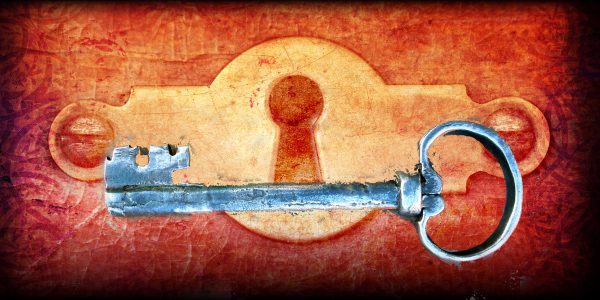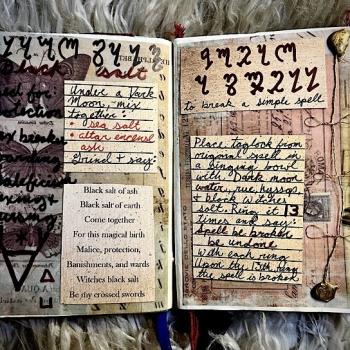I so often wonder what it is about people that leads us to this place. I see fear leading to anger and then conflict with two polarized sides. What is it about us humans? Do we really have the capacity to move past the fear and the anger, the bigotry, the egotism and “I must be right” perspective? I hope so. But hope hurts, because I see this cycle of fear and conflict over and over.

Through social media, I learned about the attacks in Paris…and then I learned about the less-publicized attacks in Beirut. And also the attacks in Nairobi that left almost as many dead as in Paris, but these attacks received no media coverage. And then I see people posting about Black churches being burned, and that not receiving media coverage, nor are the people perpetrating those crimes being labeled terrorists…and the same thing for attacks on Planned Parenthood clinics.
Focusing on Pagan-specific social media, more pain and upset. The conflict between the hard polytheists and the atheist Pagans continues, but the current napalm is another blowup where some Pagan elders have (again) made transphobic comments.
In a Facebook conversation, someone pointed out to me that I can’t possibly equate physical violence on another person with words being flung, but I can’t help but see how they are related. See–whether we’re talking about bombings or shootings or blog wars, we’re talking about fear and anger, and often bigotry. We’re certainly talking about intolerance, and I think a lot of the root of intolerance is all bound up in our own egos and egotism, particularly our desire to be right.
I say we and our because I see this so commonly in people. I have written in the past about my struggles with being a know-it-all in the past, and how genuine self esteem, healthy self confidence, and healing some of the wounds of my own ego has helped me to move past some of that, though I’m far from perfect.
What does that have to do with bombings and transphobia? There seems to be an innate human desire to be right. Or, to have joined the right cause. Or, to please the people around you. We want to know we chose the right path, joined the right group, believed the right things. It’s why dogma is so problematic, because it allows people to just subscribe to something dictated by someone else without engaging our critical thinking engines. We want to know we’re part of the “right” belief set because it’s relaxing. It’s safe.
Quite frankly, I think it gives our brain a break. It gives our ego a rest.
Ego has a few jobs, and one of those jobs is to ensure we feel good about ourselves. And, if we’ve been baptized in the right religion, or if we’ve joined the right political party, if we subscribe to the right philosophies…well, then we’re “good.” And, good is safe. Most people aren’t sitting there thinking about all of this; they are raised to believe certain things are “good” and certain things are “bad.” It becomes a kind of autopilot. Whatever cultural or religious norms we’re raised with, we often don’t contradict them til we have a reason.
Cognitive dissonance makes this part difficult. You can read more about cognitive dissonance on Wikipedia or via a quick web search, but in essence, it’s the fact that our brains don’t process new/contradictory information very well. Once we have a particular belief about the world and how it works, we stick to that belief even in the face of overwhelming evidence. It’s the result of the brain trying to save energy; our brains are actually pretty lazy sometimes.
Your brain will basically filter out the new information as untrue so you don’t have to think too hard about it because that involves work. I’ve mentioned it before in articles I’ve written about sexual harassment and sexual abuse; when people are told that their beloved coworker has been sexually harassing people, they will jump to defend the person. “No, Pat is a good person, Pat would never do that.” That’s a few different defense mechanisms going on, but cognitive dissonance is part of it. You can also see cognitive dissonance at play when people who subscribe to specific politics are shown scientific data that refutes one of their political beliefs. They frequently will try to say the data is flawed rather than acknowledge that their belief might be flawed.
Getting back to cultural norms and the philosophies and politics we subscribe to, the end result is that desire to be right, to be part of the “right” thing, leads to conflict when we face someone who doesn’t believe the way we do. Sometimes the conflict involves bombs and guns. Sometimes it’s a blog/trolling war.
Typically in Pagandom it’s the latter, but I believe that there’s value in looking at the roots of both types of conflict, and I think that what’s essential in this is the desire to be right and to be part of the right thing.
The word tolerance gets used a lot, and that’s a problematic word. On the one hand, it’s a useful word for something like interfaith dialogue, the idea being that we don’t have to fight one another, that we can tolerate other religions. It becomes problematic when you have people engaging in bigoted behavior, saying racist or transphobic or sexist things, and people defend the speaker by saying that we must “tolerate” their point of view. And I see this defense used a lot in the Pagan community. “You’re the bigot if you’re excluding someone for saying something bigoted,” some folks have tried to tell me.
In a word, no. It’s not bigoted to exclude a bigot. It’s not intolerant to call out a bigot.
The question then becomes one of ethics and morals and values. In essence–who is right? What is bigoted and what isn’t? What should we tolerate and what shouldn’t we?
Here are some things that squirm around in my brain. Let’s look at the word terrorist. What one person might call a terrorist, another might call a freedom fighter, a hero. On the one hand, I abhor violence; on the other, I understand that if someone threatened my beliefs and way of life, I’d absolutely fight back. There are some groups out there labeled as terrorists, yet they are oppressed and fighting for their lives, in some cases fighting genocide. I can’t really fault folks for using any means to survive in those circumstances.
But, there are plenty of other terrorist groups citing that they are protecting their way of life, their culture, their religious beliefs…and I find myself in conflict with those beliefs. I want to be tolerant of other beliefs, but there’s a line I face.
When we’re talking about Muslim extremists or Christians burning Black churches or Planned Parenthood clinics, we’ve come to a conflict of beliefs. Both sides believe they are right. Maybe religion’s the motivating factor and the person believes that everyone must convert to that faith or be killed. Maybe the person believes that people of color are inferior to white people, believes that being gay or lesbian is evil, or that it’s acceptable to harm transgender people. Maybe the person believes that sex is only for reproduction, that women should obey men, that contraception is sinful, that wives can’t be raped by their husbands, or that women should be forced to carry any pregnancy to term.
I can’t agree with any of those things. I don’t want to play the “right/wrong” card, but none of these are things I am willing to tolerate.
So, many conflicts are sourced in that need to be right. The anger rises up from the perceived attack to someone’s self image. And when both sides of a conflict are convinced they are right, that they know what “good” is, there isn’t going to be much that budges them. Some of the conflicts we face in the Pagan community aren’t clear cut. I have tried to stay out of the Pagan atheism vs. polytheism debate, for example, for a while now in part because it can be kind of confusing to follow.
However, the issues that keep surfacing about discrimination against transgender people is a conflict that touches on those big issues of bigotry, discrimination, and intolerance.
Whenever I’m about to accuse someone of being bigoted, of being discriminatory, I always try and first turn the tables; I try and think about how I’d feel if they pushed their beliefs on me. I believe it’s wrong to discriminate against someone based on their gender…or based on them not identifying on the gender binary, for that matter. I believe it’s wrong to discriminate against someone based on the color of their skin. I believe it’s wrong to tell someone they can’t get birth control or have an abortion or have sex or masturbate. I believe it’s wrong to try and force everyone to follow your religion. I don’t believe any one religion is “right” all the time.
I’m trying to not get sucked into the need to be right, and yet, I feel pretty strongly that I stand on the “right” side of history. I stand for women’s rights; for sex positivity; for people to be able to be out and open about their religion; for people to be gay, lesbian, bisexual, pansexual, queer, trans, bi-gendered, or non-gendered; to be monogamous or polyamorous or asexual and to live their lives without discrimination and harm; and for people of any color to have the same opportunities. I could go on, but you’re probably pretty clear where I stand.
The current conflict over specific Pagan elders making transphobic comments (and then their followers, fans, and friends continuing to support those elders) is an important one for a number of reasons. One is a strategic point. As an activist, I see this as a teachable moment. When this came up at PantheaCon a few years ago, I didn’t know much about transgender issues. That conflict prompted me to learn about the struggle transgender people face in the Pagan community (and in the broader world) and helped me to become a better ally by educating myself. So these types of conflicts–while painful–can help people to understand that there’s even an issue in the first place. It’s hard to be a transgender ally if you aren’t aware that 1. there are transgender people, and 2. that they face discrimination in the Pagan community.
Another reason this is an important conflict is because it is a microcosm of a broader issue–how do we hold our elders, teachers, and leaders accountable?
One of the Pagan elders currently making transphobic comments is Ruth Barrett. I mention her by name because she’s done it before, and I don’t expect her to change her mind. Like many leaders and authors, Ruth has a strong following. And going back to that concept of cognitive dissonance, there’s just a human function where people who like someone and believe in them are unwilling to believe that their friend, family member, teacher, leader, or favorite author could be wrong. So, when other folks try to speak up against someone like Ruth, we go back to those intractable conflicts because not only will the leader/elder not back down, the followers won’t either.
Now, the problem is that those calling for accountability–particularly in this case–are using language like “You’re not my elder.” Here’s why this is problematic; saying someone isn’t a Pagan elder doesn’t fix the situation. I get the sentiment, but it’s not accurate. Here’s what I mean; Ruth Barrett has helped to shape the Pagan community, specifically in the realm of Goddess spirituality and empowering women. She’s written some great music, she’s written some great books and articles. She’s helped a lot of women. You can’t go back in time and say she didn’t do those things, that she didn’t have an impact on the broader Pagan community.
Just as I can’t say that Marion Zimmer Bradley didn’t make science fiction writing more accessible for women writers. MZB absolutely helped many women writers launch their careers in science fiction and fantasy. MZB also aided (if not perpetrated) sexual abuse of children. Both are true. I can deplore the abuse, and still acknowledge the good she did.
Similarly, when the news came out about Kenny Klein’s arrest for possession of child pornography, and his (alleged) sexual abuse of minors in the Pagan community, many Pagans had the response, “He wasn’t a real Pagan.” That response isn’t really helpful. Yeah–sadly, we have some really sick, horrible, twisted people in the Pagan community. Because, we’re human. Saying he wasn’t Pagan isn’t useful, it’s a deflection.
That’s why I’m not jumping on the “you’re not my elder” bandwagon, because it’s inaccurate and not useful. I’m not suggesting we sweep these things under the rug, not in any way. What is useful is calling for accountability. Ruth (and other Pagan leaders) have done great work in the overlapping Pagan communities. They paved the way. And, yet many of these Pagan leaders have said or done deplorable things. The question becomes, what does accountability look like?
Some are calling for boycotts, and those can be useful to a point. For instance, I’d never hire anyone I knew to be transphobic to speak at an event I’m running. I wouldn’t attend their events. I wouldn’t buy their book, or do anything to promote their work. But in the Pagan community, boycotts have limited success. I do believe there’s still a value in speaking up and calling for accountability, but in the end, it’s rare for a Pagan leader/elder/author to have anyone they are accountable to that has the power to censure them. People have been calling for boycotts on the Frosts for years because of their infamous chapter four which outlines an initiation ritual that is sexual abuse of a minor, and the Frosts still travel and teach and have a large, dedicated fan base.
I wish I had answers. I don’t like to sit down and write about something that hurts, something that matters, and not have a way to tie it together at the end, but that’s where I’m at with this. Is it important to speak up? Yes. Is it important to hold elders and leaders accountable? Yes.
The answer isn’t to say, “They aren’t real elders.” It’s a waste of time to try and pretend that these folks didn’t do good in our community. It’s also a waste of time to try and defend their actions under the banner of tolerance. And sadly, that’s what you’ll see a lot of–people who completely focus on defending their teacher/leader/friend instead of being willing to listen and take in the harm that their teacher did. Or, you’ll see people trying to use the argument that if you are discriminating against a bigot (or an abuser) that you, also, are bigoted.
I don’t have answers, because these are humanity’s great questions. How do we navigate conflict when both sides are convinced they are right? How do we sit with paradox, with two things that are in contradiction and yet both are true?
If I had one wish for humanity, it would be that everyone could hold more paradox. That we humans weren’t limited by this crippling cognitive dissonance that says that once we believe that ABC is Right, that ABC is always Right and nothing can change that mindset. What would the world be like if we weren’t ruled by fear and anger? If we weren’t stuck in a certain way of thinking? How much of our lives are we acting out of fear? How much does fear motivate us? What would my own life be like if I weren’t bound by my own fears?

Patheos Pagan on Facebook.

the Agora on Facebook
Seeking the Grail is published on monthly on the third Monday. Subscribe via RSS or e-mail!
Please use the links to the right to keep on top of activities here on the Agora as well as across the entire Patheos Pagan channel.

















